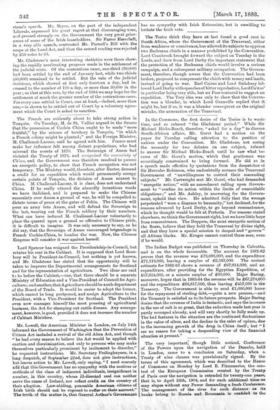In the Commons, the first desire of the Tories is
to waste- time, and so exhaust "the Gladstone period." While Sir Michael Hicks-Beach, therefore, "asked for a day" to discuss South-African affairs, Mr. Gorst bad a motion on the paper for Tuesday calling attention to the position of natives under the Convention. Mr. Gladstone, not seeing the necessity for two debates on one subject, refused to answer Sir Michael Hicks-Beach until he saw what be- came of Mr. Gorses motion, which that gentleman was accordingly constrained to bring forward. He did so in a speech made effective by quotations from the despatches of Sir Hercules Robinson, who undoubtedly accuses the Transvaal Government of "unwillingness to control their marauding subjects." Mr. Cartwright met Mr. Gorst, who had demanded "energetic action," with an amendment calling upon Govern- ment to "confine its action within the limits of unavoidable obligations ;" and Mr. Ashley, in answering for the Govern- ment, upheld that view. He admitted fully that the wrongs perpetrated "were a disgrace to humanity," but declined, for the reasons advanced by Lord Derby, to go beyond remonstrance, which he thought would be felt at Pretoria. For reasons stated elsewhere, we think the Government right, but we have little hope- from remonstrance. The Doppers, the most energetic section of the Boers, believe that they hold the Transvaal by divine right,. and that they have a special mission to despoil and "govern" all African blacks. Mr. Kruger cannot control these men, even if he would.


































 Previous page
Previous page